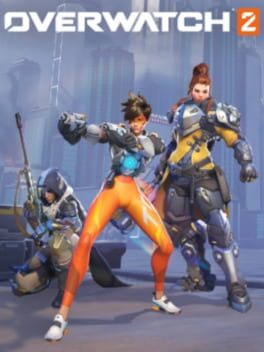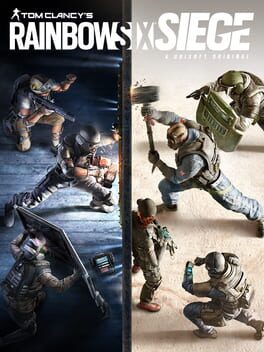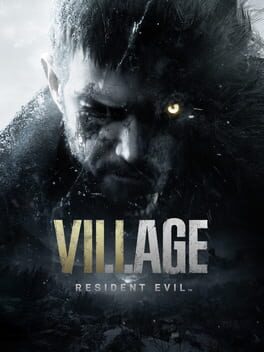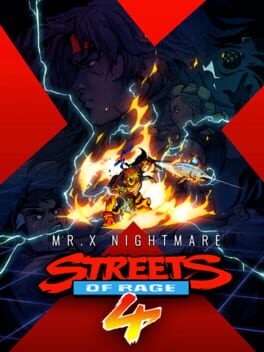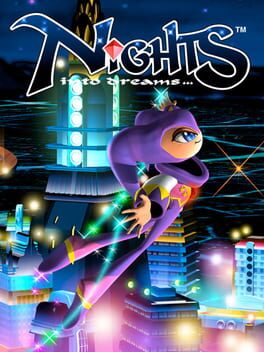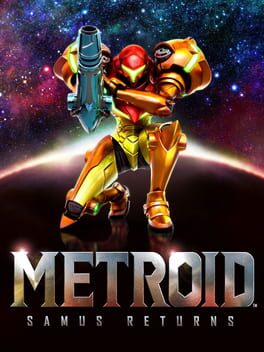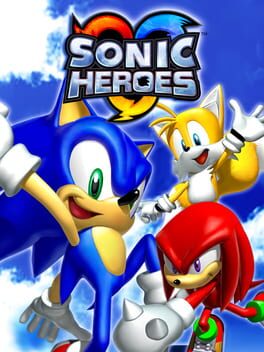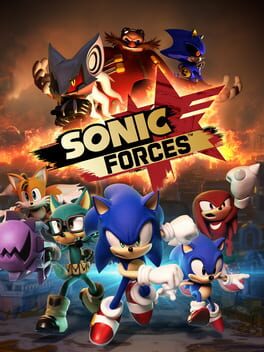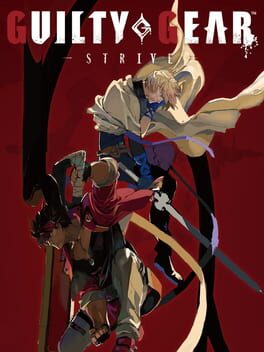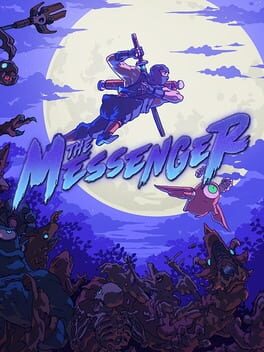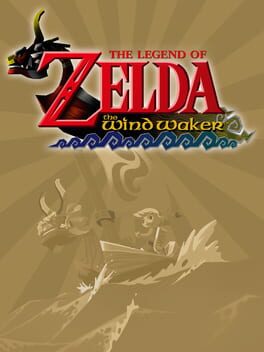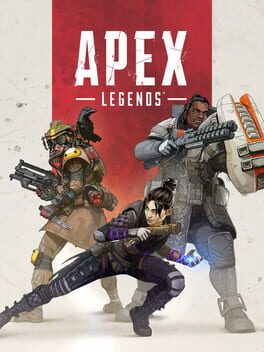jg27
2019
Trims out all the fat of most RPGs and leans hard on upholding the most compelling elements: growing and shaping an actual character through careful decision making. this time instead of a springy young adventure you're playing a washed up detective reaching fifty that's burned his whole life down in a depressive, alcohol fueled blaze. Clearly a huge mistake that's left him scarred and isolated, but the light at the end of the tunnel is that you can truly only go up after you hit rock bottom. Stop hating yourself and start building. For the good of the world.
2022
Excellent world design and exploration, but when your "reward" is another dull damage spongey roll spam screen eating monstrosity of a boss or another weapon you can't use until you're specced right it takes the wind out of it's own sales. Probably the best FROM game since the first Dark Souls but that's not saying much.
2007
Really wanted to like this. Aesthetically it feels like it was made for me and all the effort that went into fleshing out Santa Destroy and characterizing Travis is a delight but as an actual GAME it's half assed and boring. Nonexistent level and enemy design, no variety in terms of options Travis has and bosses didn't have much thought put into it beyond their designs. It's a shame, because those designs are some of the very best I've seen in a video game. They deserve a better space to play in. I'd have to be convinced to give the rest of the series a try.
2022
This game made all the changes I wanted for OW and I still do not really like it so far. It's hard to place why.
The main selling point for the game is a rebalance focused on a highly requested shift away from barriers and aoe abilities and toward movement and aim mechanics. On the face of it, this feels great. One less tank and some reworks to problematic heroes gives fan favorites like Tracer, Genji, Winston and Reinhardt space in the game again without being stunlocked to death. It remains to be seen how long this new balance state holds but it seems like a good start so far.
The problems come in when such a quick rebalancing comes against overwatch's older maps and systems. A lot of arcade modes just feel broken with the new tanks. Open queue is so fucked up now that imo they need to take it off the main menu screen. I already had one friend delete the game because it gave them the wrong idea.
Maybe it's because the new monetization schemes feel egregious. I bought into the first battle pass to give them a chance on it and while unlocking stuff is kind of satisfying so far the new store isn't. Overwatch skins are cool but paying as much as I would for a new skin in another game for old OW1 skins feels grimey. Theres some cool stuff that I feel like should be fine to slap on the battle pass, but they're asking for 10 extra dollars instead, like the cyber Sojourn skin.
The new hero kits are a step in the right direction after the ow1 DLC was so bad it pretty much killed the game, but man some of these abilities still feel ridiculous. Why do support still get free escapes as the other classes are reworked to reward smart utilization of movement abilities? Why is there even still easy to execute immortality ability still in the game?
What's worse is what they didn't change though. Pace breaking abilities like immortality field are still in the game even though they hardly require any skill to use and just feel bad to deal with for the other players. Hard counters still exist in a game where players now have to unlock every hero through a progression system. The new heroes have notably toned down ultimates which clashes hard with things like Junkrat's tire still being in the game unaltered. Heroes like Mccree and Mei have been gutted by the CC changes without much in the way of meaningful buffs to help them out.
So many changes just feel thoughtless. The medal system has been removed and replaced with a standard k/d screen that just displays numbers without meaningful context. The scorecards at least highlighted players that leaned into their hero's playstyle. Now it's not clear if the guy with high damage was actually doing work for spraying into tanks the entire time. Was the healer with low healing screwing around or split between healing and providing support damage?
This is all paired with the fact that the big single player content that was supposed to justify the sequel numbering didn't even ship with the game. The whole point of this game was to give people who loved the world of overwatch but don't care for the competitive aspect more to chew on, but what they've released instead was a visual downgrade that actively removes a host of iconic locales and doesn't move the story forward at all. A lot of the dialogue has even been replaced with actively worse material. All those people have to sit with is an even more competitive game than before with less of the world to compensate.
It just feels like a mess of halfbaked, poorly considered changes that have created all new problems. New problems that will take at least another year of development to iron out. I loved Overwatch, but it's been 6 years. I'm tired of waiting for it to find itself.
The main selling point for the game is a rebalance focused on a highly requested shift away from barriers and aoe abilities and toward movement and aim mechanics. On the face of it, this feels great. One less tank and some reworks to problematic heroes gives fan favorites like Tracer, Genji, Winston and Reinhardt space in the game again without being stunlocked to death. It remains to be seen how long this new balance state holds but it seems like a good start so far.
The problems come in when such a quick rebalancing comes against overwatch's older maps and systems. A lot of arcade modes just feel broken with the new tanks. Open queue is so fucked up now that imo they need to take it off the main menu screen. I already had one friend delete the game because it gave them the wrong idea.
Maybe it's because the new monetization schemes feel egregious. I bought into the first battle pass to give them a chance on it and while unlocking stuff is kind of satisfying so far the new store isn't. Overwatch skins are cool but paying as much as I would for a new skin in another game for old OW1 skins feels grimey. Theres some cool stuff that I feel like should be fine to slap on the battle pass, but they're asking for 10 extra dollars instead, like the cyber Sojourn skin.
The new hero kits are a step in the right direction after the ow1 DLC was so bad it pretty much killed the game, but man some of these abilities still feel ridiculous. Why do support still get free escapes as the other classes are reworked to reward smart utilization of movement abilities? Why is there even still easy to execute immortality ability still in the game?
What's worse is what they didn't change though. Pace breaking abilities like immortality field are still in the game even though they hardly require any skill to use and just feel bad to deal with for the other players. Hard counters still exist in a game where players now have to unlock every hero through a progression system. The new heroes have notably toned down ultimates which clashes hard with things like Junkrat's tire still being in the game unaltered. Heroes like Mccree and Mei have been gutted by the CC changes without much in the way of meaningful buffs to help them out.
So many changes just feel thoughtless. The medal system has been removed and replaced with a standard k/d screen that just displays numbers without meaningful context. The scorecards at least highlighted players that leaned into their hero's playstyle. Now it's not clear if the guy with high damage was actually doing work for spraying into tanks the entire time. Was the healer with low healing screwing around or split between healing and providing support damage?
This is all paired with the fact that the big single player content that was supposed to justify the sequel numbering didn't even ship with the game. The whole point of this game was to give people who loved the world of overwatch but don't care for the competitive aspect more to chew on, but what they've released instead was a visual downgrade that actively removes a host of iconic locales and doesn't move the story forward at all. A lot of the dialogue has even been replaced with actively worse material. All those people have to sit with is an even more competitive game than before with less of the world to compensate.
It just feels like a mess of halfbaked, poorly considered changes that have created all new problems. New problems that will take at least another year of development to iron out. I loved Overwatch, but it's been 6 years. I'm tired of waiting for it to find itself.
A grounded, tactical slow burn that rewards engagement with pitch perfect ______ as much as it does nonstop hilarity. Many shooters have come and gone out of my rotation, but Siege persists because there really is nothing else like it.
Guns in Siege roar with a lethal killing machines in ways surprisingly few games manage, and the way they turnenemy players, walls, doors, and even your own team into mince meat brings the loop together. Killing people just feels good, which is good because the lead in asks way more patience of the player than most.
Movement options you take for granted in other shooters leave you extremely vulnerable, so aggressive play has to be put aside with trepidation, scouting, planning and re-planning based off of new information taking it's place.
To ask for such restraint in a genre that was becoming increasingly about aggressive play and instant gratification is the kind of risk you can't imaging a developer taking, even now that tactical and RPG-lite elements have a foothold in the genre.
The game sounds rigid, but the destruction system creates a sort of free-flow approach to most combat scenarios. The map is full of soft walls you can open up to create sight lines and paths, meaning maps are never as simple as they first appear. Attackers and defenders can use walls and floors to gather intel deceive, take a cheeky angle or escape. The defending team can turn a soft wall into a hard one, giving them some protection and control over the flow of the map, leaving the attackers to have to burn resources to get inside.
Which brings us to the final piece of the puzzle: the gadget system. Team Rainbow has a host of operators that all have their own design, load out and gadgets. The primary gadget serves as that operator's unique mechanic. They range from a simple, but effective tool like a wall breaking sledge hammer to hard sci fi like the gemini replicator, a holographic clone of yourself you can use to safely enter and scope out rooms. The best of these have their own micro-gameplay loop attached. The hard breaching tools are the most valuable for the attacking team, so escorting them to the sight becomes a priority for the entire team. Dokkaebi can sus out roamers hiding in the corners of maps with a gadget that rings their phones and gives away their proximity, with a reward for a successful kill being access to the entire building's cameras. Caviera has underwhelming guns, but aggressive stealth and movement options that encourage her to down enemies before they can see her. Pulling this off successfully rewards you with an interrogation, the reward for which is a mess.
This system isn't flawless. Some operators have gadgets so useful that they're basically mandatory, which means somebody on the squad is going to have to play hard breach, or pass on the more active playstyle of roamer to anchor. Putting characters out so frequently also results in some misfires, which is a pretty inexcusable problem to have when the DLC opps cost ingame currency that you'll spend long hours grinding. Spending hard earned renown on an operator that isn't fun or impactful isn't the best feeling. and what isn't and even then, some pretty clumsy balance patches have already destroyed the potential of some character. You'll have to rely on other players to sus out what's good.
Speaking of community, the game requires so much coordination that playing with randoms is basically a crapshoot. One thing I can give other shooters over this one is that I rarely think about turning Siege on if I don't have a squad. The game has a lot of nuances that the average player misses, which pairs with lack of communication and toxicity to create a frustrating experience, This game is best experienced with as many people you know already as possible. Even when a plan goes poorly, it's easier to laugh the whole thing off with friends.
Even that can't save you from the amount of cheaters in the game, though, especially in Ranked play. This will probably be a game-breaker for some people, which is fair. I think the game is worth taking seriously, but until Ubisoft fixes it's infastructure it'll be hard to actually do it.
Guns in Siege roar with a lethal killing machines in ways surprisingly few games manage, and the way they turnenemy players, walls, doors, and even your own team into mince meat brings the loop together. Killing people just feels good, which is good because the lead in asks way more patience of the player than most.
Movement options you take for granted in other shooters leave you extremely vulnerable, so aggressive play has to be put aside with trepidation, scouting, planning and re-planning based off of new information taking it's place.
To ask for such restraint in a genre that was becoming increasingly about aggressive play and instant gratification is the kind of risk you can't imaging a developer taking, even now that tactical and RPG-lite elements have a foothold in the genre.
The game sounds rigid, but the destruction system creates a sort of free-flow approach to most combat scenarios. The map is full of soft walls you can open up to create sight lines and paths, meaning maps are never as simple as they first appear. Attackers and defenders can use walls and floors to gather intel deceive, take a cheeky angle or escape. The defending team can turn a soft wall into a hard one, giving them some protection and control over the flow of the map, leaving the attackers to have to burn resources to get inside.
Which brings us to the final piece of the puzzle: the gadget system. Team Rainbow has a host of operators that all have their own design, load out and gadgets. The primary gadget serves as that operator's unique mechanic. They range from a simple, but effective tool like a wall breaking sledge hammer to hard sci fi like the gemini replicator, a holographic clone of yourself you can use to safely enter and scope out rooms. The best of these have their own micro-gameplay loop attached. The hard breaching tools are the most valuable for the attacking team, so escorting them to the sight becomes a priority for the entire team. Dokkaebi can sus out roamers hiding in the corners of maps with a gadget that rings their phones and gives away their proximity, with a reward for a successful kill being access to the entire building's cameras. Caviera has underwhelming guns, but aggressive stealth and movement options that encourage her to down enemies before they can see her. Pulling this off successfully rewards you with an interrogation, the reward for which is a mess.
This system isn't flawless. Some operators have gadgets so useful that they're basically mandatory, which means somebody on the squad is going to have to play hard breach, or pass on the more active playstyle of roamer to anchor. Putting characters out so frequently also results in some misfires, which is a pretty inexcusable problem to have when the DLC opps cost ingame currency that you'll spend long hours grinding. Spending hard earned renown on an operator that isn't fun or impactful isn't the best feeling. and what isn't and even then, some pretty clumsy balance patches have already destroyed the potential of some character. You'll have to rely on other players to sus out what's good.
Speaking of community, the game requires so much coordination that playing with randoms is basically a crapshoot. One thing I can give other shooters over this one is that I rarely think about turning Siege on if I don't have a squad. The game has a lot of nuances that the average player misses, which pairs with lack of communication and toxicity to create a frustrating experience, This game is best experienced with as many people you know already as possible. Even when a plan goes poorly, it's easier to laugh the whole thing off with friends.
Even that can't save you from the amount of cheaters in the game, though, especially in Ranked play. This will probably be a game-breaker for some people, which is fair. I think the game is worth taking seriously, but until Ubisoft fixes it's infastructure it'll be hard to actually do it.
The "Twilight Princess" of Resident Evil. Doesn't do anything exceptionally well, but shaves off most of the series's weak points to create a consistent, polished piece of survival horror. There's enough thought put into exploring that there's satisfying secrets to find everywhere and enough thought put into combat that popping enemy heads feels good, but you'll probably have standout examples of both in other games at the back of your mind while playing this. Combat especially with how terminally addicted this game is to referencing resident evil 4 at every turn.
This isn't to say Village doesn't have standout moments of it's own, but it's mostly on the atmosphere and characterization side. The plot is even more paper thin than usual but this cast of creatures is bursting with personality from point one. They put you in a lot of really entertaining and unique scenarios even if most of them are a little too stupid to be threatening. Rounding out the cast is Duke. First he seems like another shady salesman but slowly he turns into the player's only relief from violence, illusions and betrayal. The game's story is a complete mess that's nearly impossible to get emotionally invested in, but their last conversation is a highlight. The weak points largely come from the extended cast from previous games. There's not a single logical justification for Chris Redfield's behavior in this game. He causes every problem and gets several people killed.
There are also a couple of brilliant moments of horror here. It's intentionally more of a rollercoaster instead of the consistently high pitch 7 operated at, but the longer length and more complex levels makes this feel like the right call. 7 was stressful to play for extended periods but 8 squeezes moments of melancholy, existential horror and a good sense of humor in between tense scares and it flows a lot better as a result. Nothing stands out as a real low point. Not the best Resident Evil, but it's consistency is admirable and something the series should aim to hold onto.
This isn't to say Village doesn't have standout moments of it's own, but it's mostly on the atmosphere and characterization side. The plot is even more paper thin than usual but this cast of creatures is bursting with personality from point one. They put you in a lot of really entertaining and unique scenarios even if most of them are a little too stupid to be threatening. Rounding out the cast is Duke. First he seems like another shady salesman but slowly he turns into the player's only relief from violence, illusions and betrayal. The game's story is a complete mess that's nearly impossible to get emotionally invested in, but their last conversation is a highlight. The weak points largely come from the extended cast from previous games. There's not a single logical justification for Chris Redfield's behavior in this game. He causes every problem and gets several people killed.
There are also a couple of brilliant moments of horror here. It's intentionally more of a rollercoaster instead of the consistently high pitch 7 operated at, but the longer length and more complex levels makes this feel like the right call. 7 was stressful to play for extended periods but 8 squeezes moments of melancholy, existential horror and a good sense of humor in between tense scares and it flows a lot better as a result. Nothing stands out as a real low point. Not the best Resident Evil, but it's consistency is admirable and something the series should aim to hold onto.
Sonic Team's biggest weakness as a developer, by far, is the way they obfuscate the fun latent in their own experiences. We're too deep into the 'kinda amusing but far too bloated and unpolished for their own good' era of 3D Sonic to say that NiGHTS is their worst example of this, but it comes to mind when I think about what the most SONIC TEAM sonic team game is.
NiGHTS is often talked about more like it's an experiential title. It's themes, narrative, and music can make it feel like that, but it's actually a pretty tightly woven arcade game too. I'd argue that's where most of the substance lies and that the trippy visuals are a sort of window dressing.
According to interviews, the game came about after an extensive, experimental developmental period where the developers were emboldened to experiment with 3D technology. After 3-5 Sonic games in a row, depending on who you ask, everyone wanted to make something new. An extensive plan for a large scale platformer based on dreams was developed, but after extensive prototyping, the flying mechanic that they had intended for the end of the game as a big, climactic moment proved to be the only one that was any good. Whoops.
I think this shows a bit in the final version. Awkwardly shoehorned in platforming and an extremely frontloaded story that might disincentivize further replays by mistake are the big offenders here, but these flaws are turned into double edged swords by excellent decision making on the part of the leadership. The awkward 3D controls are relegated strictly to a punishment for poor control of NiGHTS and the story, while brief and light, has enough thematic heft to stick with you. Maybe it'll stick so well that you'll try the game again even after a rough first playthrough.
The flying is pure, freeform fun once you get the hang of it, but it's like nothing else released before it or since, so it's a very confusing concept to try to come to grips with in a short amount of time.
This is going to sound like I'm bullshitting you, but I really do think NiGHTS's un-evenness doubles as a strength. It feels truly like a fragmented stream of consciousness that succeeds at feeling as surreal mechanically as it is aesthetically. There are a lot of games about dreams, but they're usually a visual element supplementing bog standard gameplay. Despite NiGHTS's display of what makes a satisfying arcade game, it can't be nailed down to many existing genres or gameplay loops, especially now. It FEELS like the type of out of body experience you'd have in a dream, and the way it shies away from explaining it's core concepts and lore work to instill this feeling too.
It also helps that there's a pretty kickass arcade game under the hood if you're willing to take that rank system seriously. Let me give you a tip: Instead of turning those orbs on your first go around through the level, pass the goal and go back around again. See how many orbs and chains you can squeeze out of a single loop. All of a sudden, the game design clicks into place and you're playing an exhilarating action game with a tight arcade loop in line with the best Sonic entries.
NiGHTS is definitely an acquired taste, but lean into it's absurdity and you'll be entranced. It's a genuinely great game with an uplifting meta-narrative, top notch visuals, and the best soundtrack out of Sonic Team's legendary discography.
Some dreams feel like they're over in a few minutes, and others can feel like a lifetime. I encourage you to take advantage of the fact that this one only ends when you let it.
NiGHTS is often talked about more like it's an experiential title. It's themes, narrative, and music can make it feel like that, but it's actually a pretty tightly woven arcade game too. I'd argue that's where most of the substance lies and that the trippy visuals are a sort of window dressing.
According to interviews, the game came about after an extensive, experimental developmental period where the developers were emboldened to experiment with 3D technology. After 3-5 Sonic games in a row, depending on who you ask, everyone wanted to make something new. An extensive plan for a large scale platformer based on dreams was developed, but after extensive prototyping, the flying mechanic that they had intended for the end of the game as a big, climactic moment proved to be the only one that was any good. Whoops.
I think this shows a bit in the final version. Awkwardly shoehorned in platforming and an extremely frontloaded story that might disincentivize further replays by mistake are the big offenders here, but these flaws are turned into double edged swords by excellent decision making on the part of the leadership. The awkward 3D controls are relegated strictly to a punishment for poor control of NiGHTS and the story, while brief and light, has enough thematic heft to stick with you. Maybe it'll stick so well that you'll try the game again even after a rough first playthrough.
The flying is pure, freeform fun once you get the hang of it, but it's like nothing else released before it or since, so it's a very confusing concept to try to come to grips with in a short amount of time.
This is going to sound like I'm bullshitting you, but I really do think NiGHTS's un-evenness doubles as a strength. It feels truly like a fragmented stream of consciousness that succeeds at feeling as surreal mechanically as it is aesthetically. There are a lot of games about dreams, but they're usually a visual element supplementing bog standard gameplay. Despite NiGHTS's display of what makes a satisfying arcade game, it can't be nailed down to many existing genres or gameplay loops, especially now. It FEELS like the type of out of body experience you'd have in a dream, and the way it shies away from explaining it's core concepts and lore work to instill this feeling too.
It also helps that there's a pretty kickass arcade game under the hood if you're willing to take that rank system seriously. Let me give you a tip: Instead of turning those orbs on your first go around through the level, pass the goal and go back around again. See how many orbs and chains you can squeeze out of a single loop. All of a sudden, the game design clicks into place and you're playing an exhilarating action game with a tight arcade loop in line with the best Sonic entries.
NiGHTS is definitely an acquired taste, but lean into it's absurdity and you'll be entranced. It's a genuinely great game with an uplifting meta-narrative, top notch visuals, and the best soundtrack out of Sonic Team's legendary discography.
Some dreams feel like they're over in a few minutes, and others can feel like a lifetime. I encourage you to take advantage of the fact that this one only ends when you let it.
This was a weird one.
So, for starters, all the Metroid stuff is back, and for the most part it's good. You still get locked in a maze and told to search for secrets with little to no interruptions. Strong atmosphere, some nonlinear progression, big surprises. and that gradual sense of empowerment you get from taming a once hostile and oppressive alien world. The puzzles that you come across in this game are actually very well designed, in-line with the series best.
But all of the new stuff was a really mixed bag, from the counter to the aeion abilities to the new artstyle.
The counter grew on me, but at the start I was really let down with how much it simplified combat. Aiming was actually pretty comfortable compared to past games so adding further assistence felt like Nintendo over-correcting. It functioning as just a get-off-me button would be fine, but instead enemies charge you as soon as they appear on screen and you have to parry them to get them off. Once they're down they're basically dead already. It felt like really lazy enemy design. The second half introduces more enemy types and the bosses make their parry timings a lot less obvious and now I think it was just a misguided way to make new players feel cool and confident. It mostly works, but I still hope it's de-emphisized in Dread for the sake of making enemies feel more varied. Imo you could probably go without the cinematic component entirely and make it a simple shove.
Aeion is what I have serious beef with though. They seem like decent enough assisting tools for newer players that I didn't have a problem with, but aside from the scanner the game basically mandates their use. I feel like the scanner is a good idea, but at this point you may as well rethink that whole "mystery block" thing if most players are going to get told which ones are destructible anyway.
Instead of the shield just being something new players can use to ease the tension of combat encounters, but aside from the new foilage that it negates, damage feels like it was cranked up so you'd feel compelled to use it? At that point it's just an extra health bar. The machine gun cannon has a lot of enemies you have to kill with it too, which doesn't really amount to anything other than a simple lock-meet-key situation. Slowing down time was fun, but it came a little late for you to get much out of it.
I dunno I just feel like these could have been cool tools for newer players to use while leaving more wiggle room for returning players to ignore them.
The Metroid types are usually pretty fun to fight in isolation but all of them overstay their welcome. The Omega Metroid was a blast to fight the first couple of times but I'd seen more than enough of him by the time I finally made it to the last area. I've seen people say that this is just leaning into the original game's structure, and while that's correct I feel like Nintendo made enough changes with this game that it doesn't really hold up as an excuse. Some more types, or more varied movesets within those types, would have added a lot.
My last nitpick was that I wasn't really crazy about how it looked. It feels like darker colors and a more subtle atmosphere suits Metroid a little better. I get that it was on a handheld but I think they went a little overboard with the saturation and making just about everything in the game glow. Again, Dread doesn't look to have this problem though so it's probably just them working around the small screen some 3DSes have.
The new bosses outside of the metroids were a really pleasant surprise. Diggernaut and the last Ridley fight actually convinced me that Mercury Steam is going to make some of the most interesting bosses in the series when they get to pop off for Dread. The Ridley fight was so fun that I played it a couple times. Most of the tools you had worked against him as far as getting the upper hand.
I don't want to make it sound like I didn't enjoy this game. I'm this close to 100%ing it as I type this. It's probably the best game I've played this year, but at the same time it's probably my least favorite of the main 2D metroids barring the NES/GB originals. Zero Mission felt a lot more focused and tighter to control and Super's map can't be beat imo. I haven't played Fusion in years so there's a chance it might place above that whenever I get around to it.
So, for starters, all the Metroid stuff is back, and for the most part it's good. You still get locked in a maze and told to search for secrets with little to no interruptions. Strong atmosphere, some nonlinear progression, big surprises. and that gradual sense of empowerment you get from taming a once hostile and oppressive alien world. The puzzles that you come across in this game are actually very well designed, in-line with the series best.
But all of the new stuff was a really mixed bag, from the counter to the aeion abilities to the new artstyle.
The counter grew on me, but at the start I was really let down with how much it simplified combat. Aiming was actually pretty comfortable compared to past games so adding further assistence felt like Nintendo over-correcting. It functioning as just a get-off-me button would be fine, but instead enemies charge you as soon as they appear on screen and you have to parry them to get them off. Once they're down they're basically dead already. It felt like really lazy enemy design. The second half introduces more enemy types and the bosses make their parry timings a lot less obvious and now I think it was just a misguided way to make new players feel cool and confident. It mostly works, but I still hope it's de-emphisized in Dread for the sake of making enemies feel more varied. Imo you could probably go without the cinematic component entirely and make it a simple shove.
Aeion is what I have serious beef with though. They seem like decent enough assisting tools for newer players that I didn't have a problem with, but aside from the scanner the game basically mandates their use. I feel like the scanner is a good idea, but at this point you may as well rethink that whole "mystery block" thing if most players are going to get told which ones are destructible anyway.
Instead of the shield just being something new players can use to ease the tension of combat encounters, but aside from the new foilage that it negates, damage feels like it was cranked up so you'd feel compelled to use it? At that point it's just an extra health bar. The machine gun cannon has a lot of enemies you have to kill with it too, which doesn't really amount to anything other than a simple lock-meet-key situation. Slowing down time was fun, but it came a little late for you to get much out of it.
I dunno I just feel like these could have been cool tools for newer players to use while leaving more wiggle room for returning players to ignore them.
The Metroid types are usually pretty fun to fight in isolation but all of them overstay their welcome. The Omega Metroid was a blast to fight the first couple of times but I'd seen more than enough of him by the time I finally made it to the last area. I've seen people say that this is just leaning into the original game's structure, and while that's correct I feel like Nintendo made enough changes with this game that it doesn't really hold up as an excuse. Some more types, or more varied movesets within those types, would have added a lot.
My last nitpick was that I wasn't really crazy about how it looked. It feels like darker colors and a more subtle atmosphere suits Metroid a little better. I get that it was on a handheld but I think they went a little overboard with the saturation and making just about everything in the game glow. Again, Dread doesn't look to have this problem though so it's probably just them working around the small screen some 3DSes have.
The new bosses outside of the metroids were a really pleasant surprise. Diggernaut and the last Ridley fight actually convinced me that Mercury Steam is going to make some of the most interesting bosses in the series when they get to pop off for Dread. The Ridley fight was so fun that I played it a couple times. Most of the tools you had worked against him as far as getting the upper hand.
I don't want to make it sound like I didn't enjoy this game. I'm this close to 100%ing it as I type this. It's probably the best game I've played this year, but at the same time it's probably my least favorite of the main 2D metroids barring the NES/GB originals. Zero Mission felt a lot more focused and tighter to control and Super's map can't be beat imo. I haven't played Fusion in years so there's a chance it might place above that whenever I get around to it.
2003
All three Sonic playstyles, with all their powerful movement abilities, at the player's fingertips at any time? Why, that sounds incredible, but how would you stop that from being overpowered or redundant?
By nerfing every move so thoroughly into the ground that all the simple fun of using them is sapped out of them. By creating NEW problems with Sonic gameplay for them to solve like constant roadblocks, sluggish flight sections and larger enemy health pools to justify a switch over to knuckles less you spend the next minute whaling on enemies.
The completely fucked physics and collision are the icing on top of the shit sundae that is this game's controls. It's not "Sonic Adventure" levels of broken, but contacting anything in this game is basiclaly a coinflip on whether it'll send you off a ledge or through a floor. I'll never be one of those "Sonic was never good" people but for them to fall so far off the mark in terms of gamefeel on year 11 or 12 out of 30 probably implies some long term issues inherent to this franchise and it's creators.
How do we make every Sonic character featured thus far playable when we only have enough game for a single playthrough? Well, just make them do four playthroughs! Easy. The classics worked like that, right?
It's like someone tried to make one of those fantasy games you dreamed up as a kid and reality hit. genuinely baffling how bad this is. It only managed the one star because of the soundtrack.
By nerfing every move so thoroughly into the ground that all the simple fun of using them is sapped out of them. By creating NEW problems with Sonic gameplay for them to solve like constant roadblocks, sluggish flight sections and larger enemy health pools to justify a switch over to knuckles less you spend the next minute whaling on enemies.
The completely fucked physics and collision are the icing on top of the shit sundae that is this game's controls. It's not "Sonic Adventure" levels of broken, but contacting anything in this game is basiclaly a coinflip on whether it'll send you off a ledge or through a floor. I'll never be one of those "Sonic was never good" people but for them to fall so far off the mark in terms of gamefeel on year 11 or 12 out of 30 probably implies some long term issues inherent to this franchise and it's creators.
How do we make every Sonic character featured thus far playable when we only have enough game for a single playthrough? Well, just make them do four playthroughs! Easy. The classics worked like that, right?
It's like someone tried to make one of those fantasy games you dreamed up as a kid and reality hit. genuinely baffling how bad this is. It only managed the one star because of the soundtrack.
2017
2021
Conceptually, Guilty Gear Strive is admirable. Arcsys tried to recreate their flagship series and reexamined long held genre staples in the process. On the way to making a new type of Guilty Gear though I think they fell into a few dangerous game design pitfalls
I think the change most emblematic of GGST's design philosophy is gatlings. A gatling lets you chain your buttons into eachother freely. were exciting, made combos easy, and felt good to do while getting you in the headspace of pressing different buttons to execute attacks. Strive saw this, and decided that a well timed normal press needed to be rewarded more over something more dexterous to attract new players. Now attacks are slower with fixed followups to simplify the way to an optimal route. A clinical change that makes sense if your goal is to get more players on the path to the ranked/esports grind easier, but the fact that game feel wasn't considered at all says a lot.
There are changes like this all over the game. Shorter combos with higher damage on individual hits to emphasize basic, carnal decision making over the long chains that were satisfying to grind out and execute. Other Guilty Gear games were obsessed with pressure and oki. Perhaps it was to a fault, but setting devilish traps for players that you'd already knocked down had it's own appeal and seperated this game from other fighters. Strive brings the situation back to neutral as often as it reasonably can. Now, instead of watching their character get hit for 40 seconds the illustrious casual player gets to panic press a couple of buttons in-between strings and watch their character's face contort in slow motion like a zack snyder movie. That sensation that the situation is just snowballing for or against you is gone.
The wall-break system is probably the biggest, most controversial change. Corner combos have been replaced by a return to semi-neutral that gives you a meter boost. There's too much to gain from not indulging the system, but it makes every exchange feel samey. Gone is the feeling of cornering your opponent and either unleashing hell on them or watching them backfire. The game will pull them out of the fire soon, and then it's back to working your way in again.
Air dashing and other movement options have been reigned in so players can have time to take a sip from their drinks before reacting to eachother's movements. Character gimmicks have been streamlined to make the learning process easier, both as far as controlling your character and dealing with new matchups, meaning now people can move on to neglecting to research framedata instead of gimmicks. Most of the big damage have been reigned into counter hits or meter combos.
Questionable changes to the Guilty Gear formula that get even worse when you realize how similar it sounds to other fighting games on the market. Street Fighter introduced crush counter to emphasize big counterhits. Smash Bros sanded off as many combos as it could to focus on neutral and pressure. Almost every series has moved in this direction, and with this game being the most successful one in the series, I fear more changes are coming to pre-established greats. Homogenization is creeping into the FG genre despite, or maybe even because of it's newfound renaissance in esports and gaming culture.
Outside of the core systems, the game is beautiful but being sufficated by a few baffling UI choices that add up. The combo counter is so big and loud that it distracts from the action on screen instead of enhancing it. All the while, none of the information that the previous game's combo counter is present, so there's really no point in looking at it beyond the dopamine rush of watching a number go up. "Hearts" akin to Smash Bros's stock counter replace simple scoring display, a change that's just less satisfying to look at and more confusing to the casual player. Everyone's seen a sport, arcsys. A barrage of progression nonsense floods the screen every time you finish around, robbing you the simple satisfaction of watching your character strike a cool pose. Important details like Burst and Risc are still, somehow, too small despite how big and loud the most meaningless stuff is.
The whole reason I ended up buying this game despite my reservations from the leadup was the netcode, which is nearly flawless even compared to previous rollback games like SFV. Aside from that innovation though, online matches are still marred with this overt concern for newer players. Like, Arcsys took care to make sure that lower level lobbies couldn't be ruined by better players, but that same courtesy didn't go both ways, leading to low lever players wandering in to higher floors and wasting everyone's time in a matchmaking system that's already a hassle to mess with.
The cast have been given redesigns that make their sillouettes less strong and their sense of style less distinct. They're easier to cosplay and market now though, and that was the ultimate goal. It was the goal of all of this shit. Make a Guilty Gear that'll actually sell so we have a reason to keep this series going and don't just get turned into a licensed game house. Save the series by any means necessary.
It's just so obvious how many changes were made without the intent of enhancing Guilty Gear's unique traits and core appeal for it's previous fanbase. It's all meant for people who weren't interested before, which inevitably means taking more traits from games those people are interested in instead at the expense of the core.
Underneath the suffocating pandering, it's still Guilty Gear. The simple joy of using roman cancel to chain actions together you normally can't is still here, along with some of the series's quirky personalities, character exclusive gimmicks, and wacky distractions like fishing.
But with a few more overcorrections it would be a Street Fighter game with a unique cancel system. That's not something I can really applaud even though I'm glad Guilty Gear's future is secure. It's fun enough when it wants to be, but those flashes of what once was reminds me of nights I would spend in lobbies of Xrd with friends. Yes, friends. I wasn't a tryhard and I never really played ranked or with randoms. I was just a casual, and I was having a great time. In trying to endear itself to me, they ended up alienating me instead. This game has a long lifecycle ahead of it though. Here's hoping this entry was just to get the brand's foot in the door and enable a slow return to what made the series great, but things could just as easily go in the opposite direction. It's a 50/50.
I think the change most emblematic of GGST's design philosophy is gatlings. A gatling lets you chain your buttons into eachother freely. were exciting, made combos easy, and felt good to do while getting you in the headspace of pressing different buttons to execute attacks. Strive saw this, and decided that a well timed normal press needed to be rewarded more over something more dexterous to attract new players. Now attacks are slower with fixed followups to simplify the way to an optimal route. A clinical change that makes sense if your goal is to get more players on the path to the ranked/esports grind easier, but the fact that game feel wasn't considered at all says a lot.
There are changes like this all over the game. Shorter combos with higher damage on individual hits to emphasize basic, carnal decision making over the long chains that were satisfying to grind out and execute. Other Guilty Gear games were obsessed with pressure and oki. Perhaps it was to a fault, but setting devilish traps for players that you'd already knocked down had it's own appeal and seperated this game from other fighters. Strive brings the situation back to neutral as often as it reasonably can. Now, instead of watching their character get hit for 40 seconds the illustrious casual player gets to panic press a couple of buttons in-between strings and watch their character's face contort in slow motion like a zack snyder movie. That sensation that the situation is just snowballing for or against you is gone.
The wall-break system is probably the biggest, most controversial change. Corner combos have been replaced by a return to semi-neutral that gives you a meter boost. There's too much to gain from not indulging the system, but it makes every exchange feel samey. Gone is the feeling of cornering your opponent and either unleashing hell on them or watching them backfire. The game will pull them out of the fire soon, and then it's back to working your way in again.
Air dashing and other movement options have been reigned in so players can have time to take a sip from their drinks before reacting to eachother's movements. Character gimmicks have been streamlined to make the learning process easier, both as far as controlling your character and dealing with new matchups, meaning now people can move on to neglecting to research framedata instead of gimmicks. Most of the big damage have been reigned into counter hits or meter combos.
Questionable changes to the Guilty Gear formula that get even worse when you realize how similar it sounds to other fighting games on the market. Street Fighter introduced crush counter to emphasize big counterhits. Smash Bros sanded off as many combos as it could to focus on neutral and pressure. Almost every series has moved in this direction, and with this game being the most successful one in the series, I fear more changes are coming to pre-established greats. Homogenization is creeping into the FG genre despite, or maybe even because of it's newfound renaissance in esports and gaming culture.
Outside of the core systems, the game is beautiful but being sufficated by a few baffling UI choices that add up. The combo counter is so big and loud that it distracts from the action on screen instead of enhancing it. All the while, none of the information that the previous game's combo counter is present, so there's really no point in looking at it beyond the dopamine rush of watching a number go up. "Hearts" akin to Smash Bros's stock counter replace simple scoring display, a change that's just less satisfying to look at and more confusing to the casual player. Everyone's seen a sport, arcsys. A barrage of progression nonsense floods the screen every time you finish around, robbing you the simple satisfaction of watching your character strike a cool pose. Important details like Burst and Risc are still, somehow, too small despite how big and loud the most meaningless stuff is.
The whole reason I ended up buying this game despite my reservations from the leadup was the netcode, which is nearly flawless even compared to previous rollback games like SFV. Aside from that innovation though, online matches are still marred with this overt concern for newer players. Like, Arcsys took care to make sure that lower level lobbies couldn't be ruined by better players, but that same courtesy didn't go both ways, leading to low lever players wandering in to higher floors and wasting everyone's time in a matchmaking system that's already a hassle to mess with.
The cast have been given redesigns that make their sillouettes less strong and their sense of style less distinct. They're easier to cosplay and market now though, and that was the ultimate goal. It was the goal of all of this shit. Make a Guilty Gear that'll actually sell so we have a reason to keep this series going and don't just get turned into a licensed game house. Save the series by any means necessary.
It's just so obvious how many changes were made without the intent of enhancing Guilty Gear's unique traits and core appeal for it's previous fanbase. It's all meant for people who weren't interested before, which inevitably means taking more traits from games those people are interested in instead at the expense of the core.
Underneath the suffocating pandering, it's still Guilty Gear. The simple joy of using roman cancel to chain actions together you normally can't is still here, along with some of the series's quirky personalities, character exclusive gimmicks, and wacky distractions like fishing.
But with a few more overcorrections it would be a Street Fighter game with a unique cancel system. That's not something I can really applaud even though I'm glad Guilty Gear's future is secure. It's fun enough when it wants to be, but those flashes of what once was reminds me of nights I would spend in lobbies of Xrd with friends. Yes, friends. I wasn't a tryhard and I never really played ranked or with randoms. I was just a casual, and I was having a great time. In trying to endear itself to me, they ended up alienating me instead. This game has a long lifecycle ahead of it though. Here's hoping this entry was just to get the brand's foot in the door and enable a slow return to what made the series great, but things could just as easily go in the opposite direction. It's a 50/50.
2018
t kind of reminds me of Mario Sunshine where it gets so much right on the surface, but it doesn't hold pu under scrutinty. It's probably still the second best looking game in the series, which is an incredible achievement considering how many games have released since. It's story is a nice combination of old and new ideas that keep a level of familiarity while exploring original themes. It's overworld is the first time Zelda truly felt grandiose in scale, with my first time setting off in it still implanted in my brain alongside my first encounter with the skull kid and emerging from the temple of time as adult Link. The mere act of controlling Link has been improved substantially from the stiffness of the N64 series and even has quite a few points over Twilight Princess in this regard.
But I think this game's appeal is awfully frontloaded for a lot of reasons. I consider the meat of Zelda's gameplay to be this triad of puzzles, exploration and combat. Some parts or even entire games focus on one or the other, but the point where all of these elements come into play and intermingle with eachother is the dungones. Wind Waker's dungeons are...simpler than past entries. Noticeably more straightforward in terms of progression, shorter in length, with the easiest bosses in the series by far waiting at the end of every single one. Some of this can be read as intentional with the stated goal of the game to appeal to a newer, younger generation of players, but even with that charity there are less of them than there are in most titles and they don't really progress in a satisfying way as far as difficulty goes. I consider a steady difficulty curve important for any action game, regardless of it's intended audience, and I don't think Wind Waker nails that. Later dungeons stack on more tedium and busywork through escort missions over genuinely satisfying evolutions on prior concepts.
The overworld and the contents within it could have made up for a short and lackluster dungeon list as we saw with Breath of the Wild, but the team's heads weren't really there yet at this point. Wind Waker's map feels huge, but the actual content on offer feels small and arbitrarily locked off so that you don't expose this fact as early as you naturally would. Exploring is a tad unsatisfying when many of your discoveries will have to be saved for the late game and even then the payoff doesn't always feel worth it. As your patience wears thin, exploring starts to feel a little more like an extended loading screen more than it does a meaningful addition to the Zelda formula.
The story has a general thesis of being critical of traditions, from small jokes like Link's tunic not really being suited for this new environment to an overarching plotpoint about bringing Hyrule back to it's glory days after it's time has long past. The polarizing difference between this incarnation of Zelda and Ganondorf gets this across better than anything else. Zelda's been re-imagined as a pirate captain with newfound agency and even a new name, while Ganondorf's MO seems the same as always until the game interrogates his motivations at the end. This is all the basis for a good story, and a lot of the writing is genuinely great even before you start digging deeper into it. The story ends on a satisfying note, but with the lingering sense that Nintendo ended up falling back on old habits this time despite the promising lead in. Zelda is kidnapped and Ganondorf's forehead is caved in all over again. The fact that the series genuinely did roll back it's premise and artstyle to something more traditional after this turns that lingering disappointment into an open wound. It's just a grasp at what could have been that isn't fully committal.
This all combines with the increasing amount of padded side objectives in the main questline to create a game that wears pretty thinly on your patience by the time you're close to the end. This is, pretty bad considering it comes up shorter than most games in the series in terms of runtime. The swift sale and reworked triforce chart quests alleviate some of this tedium, but the HD version could only do so much to a game that was fundamentally stretching itself too thin. A more drastic rework is the only thing that would make Wind Waker worth another rerelease to me, but at that point you might as well just make a new game instead, right?
Wind Waker is still a great game. It still has all of the qualities that make Zelda a great series, but in a lesser quantity. Some of the experimentation falls flat, but the fact that they were willing to try this much at all and succeed at a lot of it speaks to the talent and ambition of this team. All that being said, it's my least favorite game in the 3D series and easily the one I revisited the least often. I completed it fully twice and that's probably as far as I'm willing to take it for...life, I guess. I've completed some of these games 5 times. It's a strange feeling, but this game has still given me so much that I feel weird complaining about it too much.
But I think this game's appeal is awfully frontloaded for a lot of reasons. I consider the meat of Zelda's gameplay to be this triad of puzzles, exploration and combat. Some parts or even entire games focus on one or the other, but the point where all of these elements come into play and intermingle with eachother is the dungones. Wind Waker's dungeons are...simpler than past entries. Noticeably more straightforward in terms of progression, shorter in length, with the easiest bosses in the series by far waiting at the end of every single one. Some of this can be read as intentional with the stated goal of the game to appeal to a newer, younger generation of players, but even with that charity there are less of them than there are in most titles and they don't really progress in a satisfying way as far as difficulty goes. I consider a steady difficulty curve important for any action game, regardless of it's intended audience, and I don't think Wind Waker nails that. Later dungeons stack on more tedium and busywork through escort missions over genuinely satisfying evolutions on prior concepts.
The overworld and the contents within it could have made up for a short and lackluster dungeon list as we saw with Breath of the Wild, but the team's heads weren't really there yet at this point. Wind Waker's map feels huge, but the actual content on offer feels small and arbitrarily locked off so that you don't expose this fact as early as you naturally would. Exploring is a tad unsatisfying when many of your discoveries will have to be saved for the late game and even then the payoff doesn't always feel worth it. As your patience wears thin, exploring starts to feel a little more like an extended loading screen more than it does a meaningful addition to the Zelda formula.
The story has a general thesis of being critical of traditions, from small jokes like Link's tunic not really being suited for this new environment to an overarching plotpoint about bringing Hyrule back to it's glory days after it's time has long past. The polarizing difference between this incarnation of Zelda and Ganondorf gets this across better than anything else. Zelda's been re-imagined as a pirate captain with newfound agency and even a new name, while Ganondorf's MO seems the same as always until the game interrogates his motivations at the end. This is all the basis for a good story, and a lot of the writing is genuinely great even before you start digging deeper into it. The story ends on a satisfying note, but with the lingering sense that Nintendo ended up falling back on old habits this time despite the promising lead in. Zelda is kidnapped and Ganondorf's forehead is caved in all over again. The fact that the series genuinely did roll back it's premise and artstyle to something more traditional after this turns that lingering disappointment into an open wound. It's just a grasp at what could have been that isn't fully committal.
This all combines with the increasing amount of padded side objectives in the main questline to create a game that wears pretty thinly on your patience by the time you're close to the end. This is, pretty bad considering it comes up shorter than most games in the series in terms of runtime. The swift sale and reworked triforce chart quests alleviate some of this tedium, but the HD version could only do so much to a game that was fundamentally stretching itself too thin. A more drastic rework is the only thing that would make Wind Waker worth another rerelease to me, but at that point you might as well just make a new game instead, right?
Wind Waker is still a great game. It still has all of the qualities that make Zelda a great series, but in a lesser quantity. Some of the experimentation falls flat, but the fact that they were willing to try this much at all and succeed at a lot of it speaks to the talent and ambition of this team. All that being said, it's my least favorite game in the 3D series and easily the one I revisited the least often. I completed it fully twice and that's probably as far as I'm willing to take it for...life, I guess. I've completed some of these games 5 times. It's a strange feeling, but this game has still given me so much that I feel weird complaining about it too much.
2019



